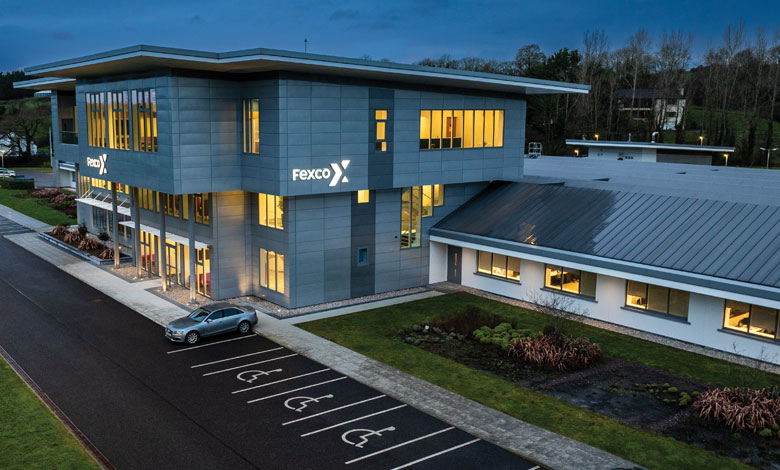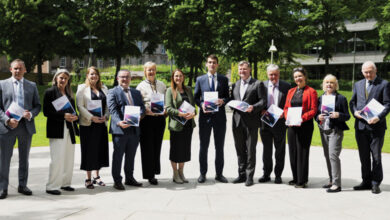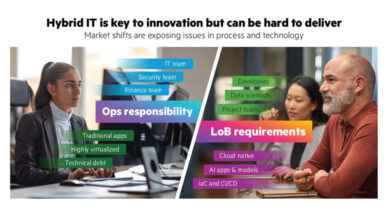How advisory innovation can accelerate Ireland’s public service transformation

 Aine McCarthy, Head of Project and Portfolio Management at Fexco Managed & Advisory Services, explores how Ireland’s public sector must continually adapt through advisory innovation to achieve sustainable, system-wide reform amid climate, digital, and societal challenges.
Aine McCarthy, Head of Project and Portfolio Management at Fexco Managed & Advisory Services, explores how Ireland’s public sector must continually adapt through advisory innovation to achieve sustainable, system-wide reform amid climate, digital, and societal challenges.
The Irish public service sector is navigating a period of unprecedented transition. The imperatives of climate adaptation, digitalisation, regional development, and evolving public expectations are creating new demands on government systems and institutions. In sectors ranging from transport to health, education to water, transformation is not only necessary, it is expected.
Delivering on this expectation requires more than investment or intent. It demands new ways of working. Advisory innovation, the strategic use of advisory support to guide, plan, and deliver complex change, is increasingly central to this task not just as a service, but as a mindset that integrates policy, delivery, and learning across public bodies and sectors.
At this pivotal moment, Ireland has the chance to embed advisory innovation into the core of its public transformation strategy, enhancing capacity, speeding up progress, and ensuring alignment with national and European priorities. It also offers an opportunity to shift from reactive policymaking to proactive governance, where transformation is guided by evidence, strategic foresight, and deeper engagement with affected communities.
Advisory innovation
Public bodies today operate in environments characterised by complexity, interdependence, and accelerating change. Transformation requires more than conventional project management; it calls for structured guidance that is responsive, informed by policy, and capable of managing risk across systems.
Advisory innovation provides this framework. It brings together domain expertise, programme management, digital fluency, and policy literacy, creating the conditions in which public sector transformation can be both ambitious and achievable.
In practice, this might involve designing new governance models, aligning service delivery with evolving regulations, integrating digital systems with legacy processes, or coordinating multi-agency implementation. Critically, the goal is not to replace internal capacity, but to strengthen it, enabling public bodies to lead and sustain their transformation journeys.
As transformation becomes an ongoing necessity, rather than a one-off event, advisory innovation must evolve as well, offering not only technical knowledge, but a capability-building ethos that embeds resilience and adaptability at every level of the public service.
Building on what works
Ireland has already seen the impact of advisory support in delivering transformation in key areas such as energy efficiency and digital public services. In these sectors, advisory partners have worked alongside public bodies to unlock funding, align with policy goals, and build long-term operational capability.
Lessons from these programmes, including the value of strategic planning, the importance of cross-sector collaboration, and the need for clear performance metrics, offer a roadmap for broader transformation across government. Where public bodies are stretched, advisory support has acted as a catalyst: enabling change while embedding new practices and frameworks that endure beyond the life of a project.
Importantly, these case studies demonstrate that the most successful transformations are those co-designed with stakeholders and tailored to specific institutional contexts. Generic approaches may offer quick wins, but sustainable transformation demands customised solutions that reflect the unique dynamics of each public service area.
Aligning with Ireland’s policy agenda
Ireland’s public sector operates within an increasingly integrated policy environment. The Climate Action Plan 2024, the National Development Plan, Housing for All, and Our Public Service 2030 all set out ambitions that are interconnected and system-wide.
These plans highlight the need for joined-up thinking, outcome-driven delivery, and data-informed decision-making. The emphasis is not only on reform, but on measurable progress — requiring public bodies to move quickly from planning to delivery, while maintaining transparency and trust.
Advisory innovation plays an enabling role in this context. It helps interpret policy into action, structure programmes to meet multiple goals, and build the governance capacity to manage risk and complexity. It also supports strategic integration — ensuring, for example, that infrastructure projects are aligned with sustainability targets, or that digital initiatives reinforce service inclusion.
In a policy environment increasingly shaped by global challenges such as climate change, health system pressures, and digital ethics give us the ability to translate strategy into locally relevant, cross-cutting action becomes a defining feature of high-performing public service systems.
Water as a public service
The water sector exemplifies the challenges and opportunities of public service transformation. Ireland’s water infrastructure is under strain with high leakage rates, ageing assets, environmental pressures, and growing demand. Addressing these challenges requires more than engineering upgrades; it calls for systemic change across planning, regulation, data, and public engagement.
Transformation in this context means embedding resilience, sustainability, and digital capability across the water system. It means linking water planning to housing, regional development, and climate adaptation. And it means building the institutional capacity to coordinate across agencies and meet regulatory obligations with agility.
The sector also offers a valuable test case for advisory innovation. From designing digital roadmaps and managing regulatory compliance to facilitating cross-sector collaboration, advisory support can help unlock the potential of water as a modern, responsive, and citizen-facing public utility.
It also illustrates how transformation is not simply about operational efficiency, but about public value — ensuring equitable access, safeguarding the environment, and reinforcing public trust in essential services.
Enabling digital and sustainable transitions
Digital transformation is now a core component of public service reform. Real-time monitoring, predictive analytics, digital twins, and smart infrastructure are no longer future concepts; they are active tools for improving service performance and public accountability.
In the water sector, for instance, digitalisation is enabling utilities to identify leaks, manage demand, and engage customers with greater precision and transparency. But the process of digital transformation from procurement to deployment remains challenging, particularly where legacy systems, fragmented governance, or limited capacity are factors.
Advisory innovation supports this transition by helping public bodies structure digital programmes that are interoperable, secure, and future-proofed. It ensures that technology investment is underpinned by strategic clarity, and that solutions are not only technically sound but also aligned with policy and service objectives.
It also enables sustainability. By integrating data and digital tools into public service delivery, agencies can better track carbon impacts, design circular systems, and ensure that infrastructure investments support Ireland’s climate and environmental commitments. These capabilities are increasingly essential in an era of resource scarcity and rising environmental accountability.
Collaboration as a catalyst for change
One of the defining characteristics of today’s public service challenges is their cross-sector nature. Water, for example, intersects with planning, housing, health, biodiversity, and local government. Delivering impact in such areas requires collaboration across organisational and jurisdictional boundaries.
Advisory support can facilitate this collaboration acting as an integrator, a convenor, and a translator across sectors and stakeholders. It can help develop shared frameworks, align funding streams, and create the governance models that allow complex, multi-stakeholder programmes to function effectively.
This collaborative approach is increasingly essential in public sector reform. It helps break down silos, build consensus, and drive more coherent, system-wide outcomes. It also fosters innovation by bringing together diverse perspectives and capabilities to tackle shared problems.
In doing so, it enables public sector organisations not only to solve immediate challenges, but to co-create the conditions for longer-term system change — where collaboration becomes the norm rather than the exception.
Embedding capacity for the long term
Transformation efforts often focus on project delivery. But enduring change requires capability, the systems, skills, and confidence within public bodies to sustain new approaches and continuously improve.
Advisory innovation contributes to this by prioritising capacity-building. This includes knowledge transfer, co-designed tools, training programmes, and the development of internal governance and performance management systems.
The aim is not to create dependency, but to empower. When done well, advisory support leaves behind stronger institutions, more transparent processes, and a culture of learning that enables public bodies to adapt and evolve long after a specific intervention has concluded.
It also ensures that innovation is not confined to leadership or isolated projects — but is diffused throughout the organisation, making transformation everyone’s responsibility.
Opportunities and imperatives
Ireland’s public sector has made significant progress in recent years, particularly in areas such as digital government, energy efficiency, and regional investment. But challenges remain — and expectations are growing.
Emerging priorities such as climate adaptation, circular economy integration, regional equity, and citizen engagement will require new approaches to transformation.
The ability to act strategically, collaborate effectively, and adapt continuously will be key.
Advisory innovation can support this shift. It provides the scaffolding for integrated planning, evidence-based decision-making, and risk-aware delivery. It enables a more agile, responsive public sector capable of delivering complex outcomes in uncertain environments.
As technologies evolve and policy priorities shift, the need for structured, expert, and strategic advisory support will only grow. Embedding advisory innovation into the heart of Ireland’s transformation agenda can ensure that ambition is matched by action — and that progress is both measurable and sustainable.
It is also a way to futureproof public institutions, equipping them with the skills, structures, and partnerships necessary to navigate future crises and opportunities alike.
Conclusion
Transformation is no longer a discrete task within Ireland’s public sector. It is an ongoing responsibility, one that must be embedded across systems, institutions, and services. Meeting this responsibility will require adaptive leadership, strategic thinking, and collaborative execution.
Advisory innovation offers a practical and proven way to enable this. It supports public bodies in navigating complexity, aligning with policy, managing risk, and building capability. And it does so in a way that strengthens public value, delivering better outcomes, greater transparency, and more resilient institutions.
In sectors like water, the opportunity is already clear. But the principles and practices of advisory innovation are equally applicable across health, education, energy, and local government. The challenge now is to scale what works and ensure that advisory support becomes a standard part of how the public sector operates in the coming years.









